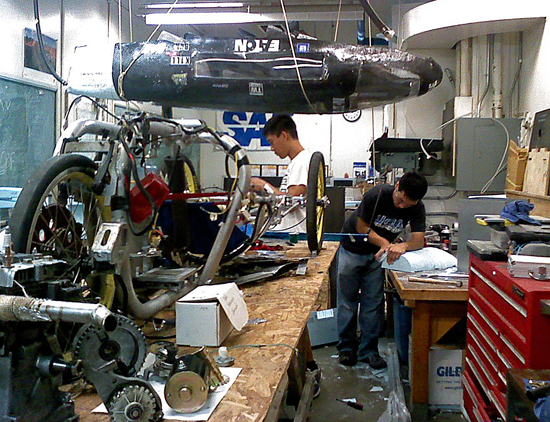The UCLA SuperMileage Vehicle team was homeward bound from the 2009 Shell Eco-marathon Americas in Houston when its car suddenly broke down. But the students refused to have their car towed ““ not if they could save their project first.
Pulling out the tools they used on the project, the team eventually repaired the car and drove back to UCLA, carrying the SuperMileage vehicle aboard.
One year later, this salvaged project is returning to the field of competition, vying against student-crafted vehicles across the nation to claim the highest fuel efficiency.
The SuperMileage Vehicle team, sponsored by the Society of Automotive Engineers, builds lightweight vehicles for two competitions every year, aiming to develop the most fuel-efficient vehicle. The UCLA SuperMileage vehicle, modeled after a bicycle and powered by an engine, will be evaluated based on the number of miles it can cover with a certain amount of gas under a given time period.
The UCLA team finished its March competition in Houston, Texas, with an efficiency of 600 miles per gallon and hopes to reach more than 1,000 miles per gallon in the June 10-11 SAE International’s Supermileage competition in Marshall, Mich.
Though the team did not place as high as members would have liked in terms of efficiency last year, the team received Eco-marathon’s Eco-Design award for using the largest amount of recycled materials for its project, said Joshua Green, team manager and a third-year mechanical engineering student.
While the team is reusing its vehicle from last year, the members are building a different exterior and implementing a new steering system to increase stability and drivability. Building upon concepts of resistance, weight, aerodynamics and simplicity, the team hopes to reach its goal of 2,000 miles per gallon this month.
In the face of human activities changing the global environment, the project is a practical, real-world application of theoretical engineering concepts, Green said.
“I wanted to get into the whole clean energy and sustainable engineering movement, and I felt that this would be effective because the whole project is to use the least amount of materials, and that’s something in the news that relates to everyone,” he said.
In constructing its $15,000 project, the team developed relationships with engineering faculty and sponsors like Lockheed Martin.
Through interactions within the team and with other organizations, members said they found themselves learning aspects of teamwork, which is important to those pursuing a career in the engineering field, said Jonathan Chu, a fourth-year mechanical engineering student.
Further, the self-directed nature of the project allowed team members to learn through trial and error and experiment with various concepts learned in the classroom, Green said. While most students spend their undergraduate years memorizing formulas and doing calculations, SuperMileage members can apply their knowledge in an effort to construct their own project.
“We get a lot of theoretical teaching in class, but there isn’t a lot of applied learning, and (this project) forces you to get into the machine shop and learn to use these tools,” he said. “It’s cool building everything on a software, designing something, and then seeing it in front of you in real life a couple weeks later.”
Though the process has been rewarding, it has come with challenges, particularly in a lack of experience in the team this year, Green said. Because a majority of the team graduated last year, the new members are learning to grow together and experiment with the construction and design process.
Team members also found they had to sacrifice time and restructure priorities in order to finish the project, said Albert Wu, a second-year materials science student. In the weeks leading up to a competition, members often work on the project into the early hours of morning instead of studying for finals.
“I put in a lot of time, but it’s definitely worth it,” Wu said. “I think that the more time I put into it, the more I see I can get back from it.”
With reports from Ryan Miller, Bruin contributor.
